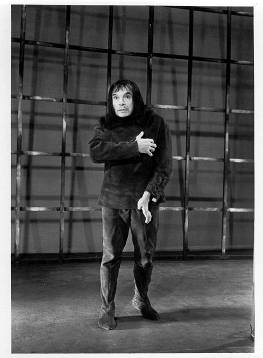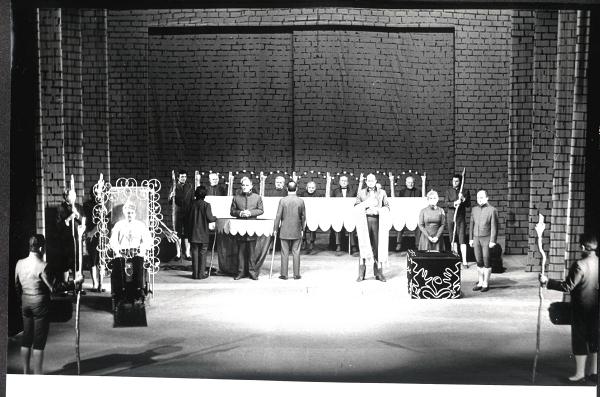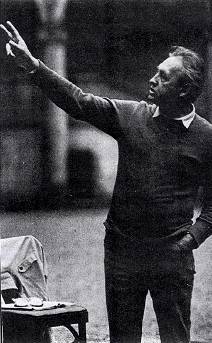Shakespeare in Poland: Shakespeare Our Contemporary
Shakespeare in Poland -- page 9
8. World War II and The Communist Regime: Shakespeare our contemporary
|
The 1963 Warsaw production of Richard III is probably best known for its unconventional treatment of history and politics. In this performance Jacek Woszczerowicz was, like Lawrence Olivier in his famous film, both the director and the main character. Reading and re-reading the whole Shakespeare canon, Woszczerowicz formulated his concept of political history as the ruthless operation of a Grand Mechanism of Power. The naturalness of Richard's cruelty, his manipulation of his opponents and supporters, the creation of his charismatic stature, was close to the hearts of the Polish public that had just gone through the Stalinist era of the "Cult of Personality." The 26th Communist Congress in Moscow replaced one tyrant with another. Kruschev, like Richmond at the end of Richard III, overthrew his predecessor and gave high sounding promises. [Note 31] |
 Jacek Woszczerowicz as Richard III, Teatr Ateneum, Warsaw 1963. Click on the image to see a larger version. |
This performance probably would never have reached the rest of the world, if not for Jan Kott's very famous book: Shakespeare Our Contemporary (1965). The first chapter of this book was about ideas that appeared in Woszczerowicz's Richard III. In his collection of essays Kott expressed his personal experiences and views on World War II and the political changes that took place after the war in Poland. [Note 32] In his interpretation, Shakespeare's texts spoke to the needs of the post war generation. They allegedly revealed "the heroes" of those time, portraits of contemporary human beings. It is Shakespeare as an existentialist, almost nihilist, an exponent of the futility of any political system. It is Shakespeare as the father of the theatre of the absurd and an advocate of sexuality and bawdiness in literature.
Shakespeare Our Contemporary was praised by the audience for whom it was intended: common readers of Shakespeare's works and theatre people. The former were given an interpretation of the chaotic, fragmented, and morally devastated world they knew from their daily experience. It was a world that did not give any solutions or hopes. The essays were, in a way, healing. They demonstrated that World War II and the post-war times were not exceptional: Shakespeare, one of the greatest playwrights of the world, talked about all these universal predicaments in his works written in the sixteenth century. At the same time the theatre people received concrete and challenging, but effective, stage concepts and solutions.
Needless to say, Kott's work called forth an avalanche of articles and books. Its reception in Poland was complicated by Poland's totalitarian reality. For years Kott was one of the most active members of the Communist Party in Poland. Many scholars still cannot forgive him the fact that he delayed for ten years the post war publication in Polish of Conrad's works. [Note 33] Their acerbic initial, attack on Kott's essays reflected this attitude. Further, there is in Poland, as everywhere else in the world, a sizeable group of Polish adherents to traditional values (especially of the scholarly provenance) who have always vehemently criticized Kott's work. They usually claim that there is an unbridged gulf between Shakespeare and our vision of the world, and that Kott has impoverished Shakespeare with his political readings. As a response to Kott's synchronic study, Przemysław Mroczkowski, for example, wrote his diachronic interpretation of Shakespeare's works: Szekspir elżbietański i żywy (Shakespeare Elizabethan and Alive, 1966). [Note 34]
From the traditional perspective of literary criticism and study, Kott's Shakespeare Our Contemporary can irritate with its simplifications and effective, but frequently superficial, comparisons. The fact is, however, that his original work did indeed revolutionise Shakespeare's studies on page and stage. One cannot be a respected Shakespeare scholar without knowing his book, while Shakespeare--and generally twentieth century theatre studies--are frequently divided into "before" and "after" the publication of Kott's work. [Note 35] One of the most famous theatrical influences of Kott's interpretation can be detected in Peter Brook's production of A Midsummer Night's Dream (1970), where the characters deliver their parts on trapezes. The presence of his ideas can also be seen in the productions by, for example, Arianne Mnouchkine and Girgo Strehler, with whom Kott closely co-operated. In Poland, the sexuality rediscovered by Kott in Shakespeare's texts prompted one director to stage Twelfth Night with an entirely female cast ( 1976). This startling production read new meanings into the Elizabethan play. (The rumour has it that one of the actresses was divorced, since her husband doubted her heterosexuality).
Before the most recent political changes in Poland (1989), Shakespeare's texts supplied directors with very safe dramaturgical material; the censors treated them as the ultimate product of the Elizabethan era. And the richness of Shakespeare's material always allowed for new interpretations. Consequently the Polish post war theatre never venerated Shakespeare as an icon of elitist culture. His plays were very often used as a commentary on the Polish contemporary situation.
For instance, the 1976 performance of Henry VIII criticised the bureaucratic reign of the then First Secretary of the Communist Party. King Henry VIII was presented as inaccessible, hiding himself behind a tapestry and approachable only through an elaborate maze erected on the stage. He was misinformed and based his judgements on his henchmen's stories. The Polish public could quite easily make the political connection. They knew that when the First Secretary visited their factories or offices, the Politburo newly carpeted these places, hung pictures taken from art galleries, and ordered meals for the workers' canteens from the best restaurants in town. Once the visit was over, everything went back to normal. Like Henry VIII of this production, the First Secretary was manipulated by connivers and deceived by appearances. Shakespeare's play was severely cut; only the first three acts were presented. But these acts satisfied the needs of the audience, who knew that they were not the only ones dissatisfied with their political and economic reality. For a short period they were united against the System, and they felt grateful to Shakespeare for "having understood their predicament" (Kujawińska Courtney, 1982: 247-272).

Henryk VIII, Teatr Nowy, Lodz, director: Jerzy Golinski, 1975.
Very often Shakespeare's plays are used as a criticism of Polish nature. In 1988 the production of A Midsummer Night's Dream exposed the Polish blind veneration of Western--especially American--culture. For instance, whenever anyone in the play wished to impose his or her point of view, the character used English. In a way the English language dominated the characters' perception of themselves and of their reality. The 1987 staging of Titus Andronicus blurred the distinction between the Romans and the Barbaric tribe. One of the main questions of this performance was "Who are we to judge the Other?" (Kujawińska Courtney, 1995: 114-121).
Since attendance at politicised dramas not only helped to generate moments of collective catharsis, but also carried the air of a meaningful gesture of defiance against the Communist totalitarianism, productions of Shakespeare's plays in the convention of "political allusions and metaphors" attracted large crowds of people. Ironically, attendance was encouraged by official policy, since under the system of state-subsidised theatre, Trade Unions bought blocks of tickets and distributed them among their members, which made a visit to the theatre a regular entertainment. [Note 36]
In Hamletyzowanie nasze: Socjologia sztuki, polityki i codzienności (Our Hamletizing: Sociology of Art, Politics and Daily Trivial, 1993), an empirical sociological study of the response to Hamlet in the years between the suspension of martial law (1984) and the introduction of a democratic system (1989), Bogusław Sułkowski caught, one hopes, the last moment of popular Polish "hametising" as a reaction to a specific political predicament. For decades the Polish intellectuals assumed the myth of Hamlet as a certain kind of behaviour under the conditions of censored discourse. In their appropriation, the tragedy emerged as a play on the tragic nature of individual fate, chaotically caught and destroyed by the crazy grindstones of history. Perceiving themselves as in the same position as Hamlet, the Polish public sympathised with his predicament, understanding it in terms of humanity's fight against history. They found sarcasm in his reaction towards history and they identified with his questioning the possibility of finding any law regulating historical processes. Saturated with nihilism, Polish viewers of the play expressed their empathy with the Prince, finding similarity between him and themselves as objects of a ruthless political manipulation, who often had to adopt unconsciously the rules of their oppressor's immoral game.
Notes
[31] Woszczerowicz encountered political hurdles before he could carry out his project; the most prestigious Warsaw theatre refused to accept him as their Richard III because of the interpreter's indirect comments on political shuffling in the Party. He went to work in a fringe theatre that guaranteed in its contract not to censor his staging of Richard III. And the management was never sorry. The play ran fully booked for five seasons. The lines for return tickets regularly stretched for more than a mile. [Back]
[32] Besides contemporary political and social issues present in Kott's works, they also demonstrate transformations of literary awareness and cultural trends. In a way, they may serve to document changes in literary and theatrical modes in the second half of the twentieth century. Kott's concepts, references, and various kinds of artistic and non-artistic reality merge and complement one another, generating new values, qualities, and structures. Marxism and daily observations, existentialism and personal confessions, psychoanalysis and semiotics are amalgamated in erudite masterpieces. There is another aspect of Kott's works. They present a constant evolution of his opinions, views, and methodologies: theatre, literature, painting, down-to-earth life comments constitute an inextricable unity. [Back]
[33] Kott labelled them the ultimate projection of an imperialist frame of mind, and therefore dangerous to the Polish people. The political changes in Poland (workers' unrest in 1956) and the exposure of Stalin's crimes in the Soviet Union made him, however, alter his position. Eventually, when in 1968 Kott endangered his situation by signing the famous letter condemning the Communist system as such, he had to seek refuge in America. [Back]
[34] See also: Gren (1959: 10) and Mroczkowski (1994: 54-61). [Back]
[35] Kott's international fame is indisputable; the biography of his works, which shows him as a theatre and literary critic, translator, literary historian, creative writer, and even a poet, constitutes a sizeable book. His achievements were recognized by many institutions and organizations. He was honoured with, for example, the Robert Lewis Medal and a Guggenheim Foundation grant. [Back]
[36] The system of state-subsidized theater was established in the late 1940s as a result of the Communists' cultural agenda. Each city with a population of at least 100,000 was to have a resident repertory company and a puppet theater. [Back]

